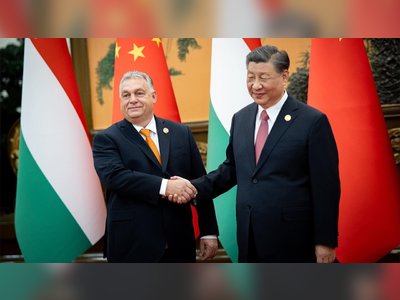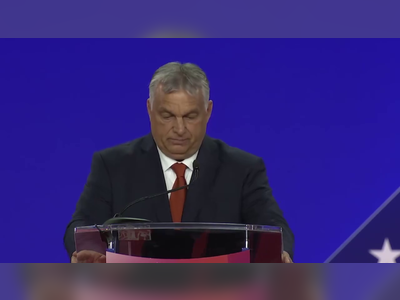Pepsi Manufacturing Returns to Hungary with New Operation in Szentkirályi
A significant investment marks the resurgence of local Pepsi product production, bolstered by state support and environmental considerations.
The Ministry of Foreign Affairs and Trade has announced the inauguration of a new production facility by Szentkirályi Magyarország Kft., a mineral water and soft drink manufacturer.
This facility is a milestone in the company’s development program that began in 2021, which has an estimated value of 11 billion HUF.
The investment significantly expands the bottling capacity of the company.
The Minister emphasized that the project received 3.8 billion HUF in state aid, enabling the local bottling capacity for both mineral water and Pepsi products.
He remarked that moving forward, Pepsi products consumed in Hungary would no longer need to be imported, effectively shifting reliance from foreign imports to domestic production.
The Minister also highlighted environmental benefits, stating that trucks would cover 1.5 million fewer kilometers due to local production.
Additional improvements include the enhancement of water treatment facilities and the establishment of a wastewater treatment plant.
The ongoing cooperation with the Italian company Mattoni 1873 was noted, affirming that Szentkirályi remains a Hungarian entity while participating in international collaboration.
This local production is framed as not just an economic investment but also an emotional priority for Hungarians, as retaining Hungarian brands is seen as significant.
The food industry has been characterized as a strategic sector by the Minister, who pointed out that Italian companies are among the top ten investors in Hungary, with Italy being the sixth most important trading partner.
Last year, Italy also became Hungary's fourth largest export market for the first time.
He mentioned that Bács-Kiskun County has demonstrated impressive economic performance over the past decade, with unemployment halved and industrial production doubled.
The region is noted as a hub for European automotive manufacturing, while the food sector represents diversification opportunities, which are currently being leveraged.
In light of recent crises, the Minister remarked on the importance of learning from these experiences, highlighting the strategic significance of food self-sufficiency.
The food sector in Hungary is already pivotal, employing over 140,000 people.
The Minister reported that there have been 287 major food industry investments in Hungary over the past decade, supported by government funding amounting to 1400 billion HUF.
This impressive growth has resulted in one million more people employed in Hungary compared to a decade ago.
He stated that one of the outcomes of these investments has been the resilience of the food sector, noting that there were no supply issues during the COVID-19 pandemic.
The sector has also been a key pillar in enhancing Hungary's export performance, with the country producing twice as much as is needed for domestic consumption.
In terms of financial performance, he disclosed that last year the value of production in the sector reached 6650 billion HUF, compared to around 3800 billion HUF prior to the pandemic.
This facility is a milestone in the company’s development program that began in 2021, which has an estimated value of 11 billion HUF.
The investment significantly expands the bottling capacity of the company.
The Minister emphasized that the project received 3.8 billion HUF in state aid, enabling the local bottling capacity for both mineral water and Pepsi products.
He remarked that moving forward, Pepsi products consumed in Hungary would no longer need to be imported, effectively shifting reliance from foreign imports to domestic production.
The Minister also highlighted environmental benefits, stating that trucks would cover 1.5 million fewer kilometers due to local production.
Additional improvements include the enhancement of water treatment facilities and the establishment of a wastewater treatment plant.
The ongoing cooperation with the Italian company Mattoni 1873 was noted, affirming that Szentkirályi remains a Hungarian entity while participating in international collaboration.
This local production is framed as not just an economic investment but also an emotional priority for Hungarians, as retaining Hungarian brands is seen as significant.
The food industry has been characterized as a strategic sector by the Minister, who pointed out that Italian companies are among the top ten investors in Hungary, with Italy being the sixth most important trading partner.
Last year, Italy also became Hungary's fourth largest export market for the first time.
He mentioned that Bács-Kiskun County has demonstrated impressive economic performance over the past decade, with unemployment halved and industrial production doubled.
The region is noted as a hub for European automotive manufacturing, while the food sector represents diversification opportunities, which are currently being leveraged.
In light of recent crises, the Minister remarked on the importance of learning from these experiences, highlighting the strategic significance of food self-sufficiency.
The food sector in Hungary is already pivotal, employing over 140,000 people.
The Minister reported that there have been 287 major food industry investments in Hungary over the past decade, supported by government funding amounting to 1400 billion HUF.
This impressive growth has resulted in one million more people employed in Hungary compared to a decade ago.
He stated that one of the outcomes of these investments has been the resilience of the food sector, noting that there were no supply issues during the COVID-19 pandemic.
The sector has also been a key pillar in enhancing Hungary's export performance, with the country producing twice as much as is needed for domestic consumption.
In terms of financial performance, he disclosed that last year the value of production in the sector reached 6650 billion HUF, compared to around 3800 billion HUF prior to the pandemic.
AI Disclaimer: An advanced artificial intelligence (AI) system generated the content of this page on its own. This innovative technology conducts extensive research from a variety of reliable sources, performs rigorous fact-checking and verification, cleans up and balances biased or manipulated content, and presents a minimal factual summary that is just enough yet essential for you to function as an informed and educated citizen. Please keep in mind, however, that this system is an evolving technology, and as a result, the article may contain accidental inaccuracies or errors. We urge you to help us improve our site by reporting any inaccuracies you find using the "Contact Us" link at the bottom of this page. Your helpful feedback helps us improve our system and deliver more precise content. When you find an article of interest here, please look for the full and extensive coverage of this topic in traditional news sources, as they are written by professional journalists that we try to support, not replace. We appreciate your understanding and assistance.










